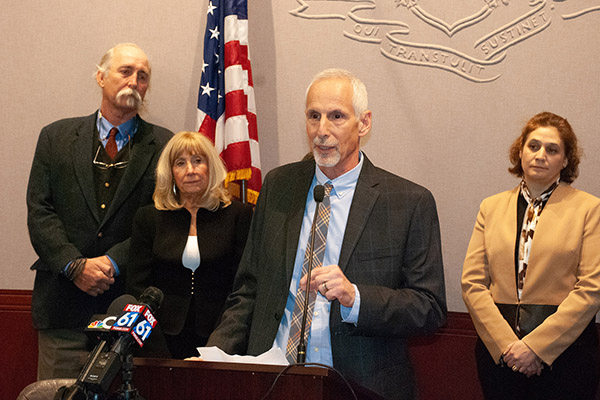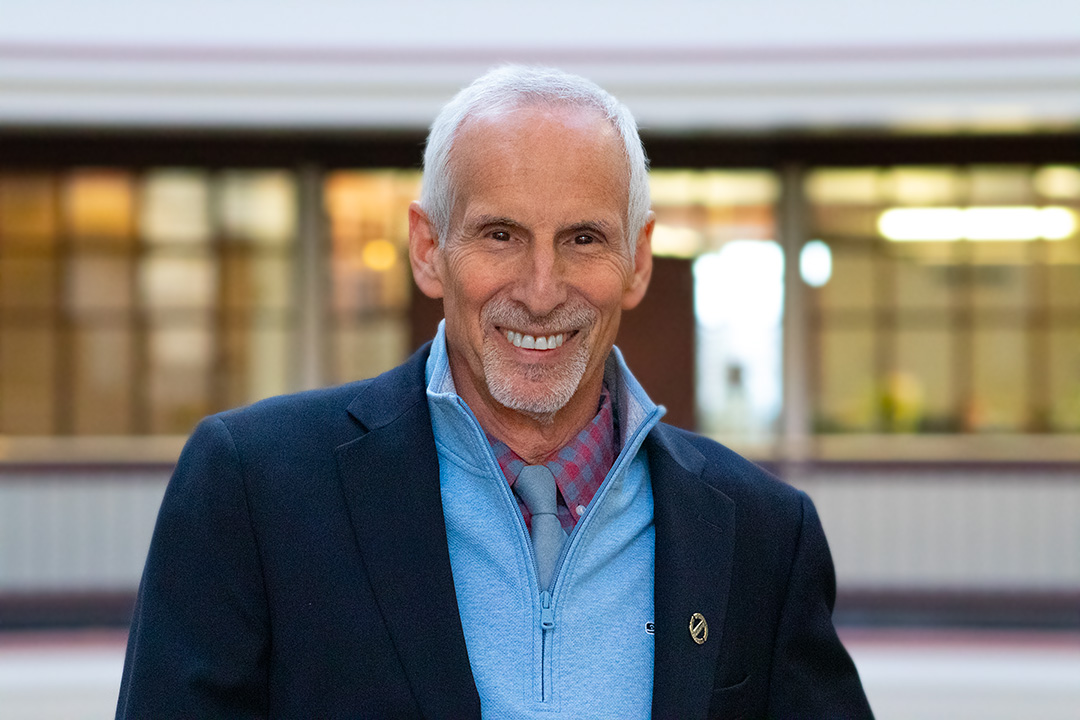Senator Needleman, District Leaders Advocate for School Cooperation Strategies

State Senator Norm Needleman, center, speaks at a Tuesday press conference regarding school collaboration and cooperation strategies, standing among leaders in his district. From left: Deep River First Selectman Angus McDonald, Region 4 Superintendent Dr. Ruth Levy and Clinton First Selectman Christine Goupil.
HARTFORD, CT – Today, State Senator Norm Needleman (D-Essex) joined a coalition of district leaders to advocate for strategies and legislation that would allow municipalities and school districts to develop and collaborate together. These new strategies would cut through red tape in current systems, allowing for eased cooperation, while preventing any requirements or mandates from the state.
Joining Sen. Needleman were East Haddam Selectman Robert Smith, Chester First Selectman Lauren Gister, Deep River First Selectman Angus McDonald, Essex Board of Education Chairman Lon Seidman, Clinton First Selectman Christine Goupil, Portland First Selectman Susan Bransfield, Region 4 Superintendent Dr. Ruth Levy, and Connecticut Association Board of Education Deputy Director and General Counsel Patrice McCarthy.
“To improve services across the whole platform of state government, we need to empower state employees to feel they’re comfortable making decisions and work with municipalities making sure the decisions that are rendered are correct for those towns,” said Sen. Needleman. “This is a solution that would begin to allow for more collaboration in education and with special education costs. We want to open up and provide creativity and incentive, allowing people to think for themselves as long as the outcomes are correct.”
The Education Committee’s Bill No. 1069, “An Act Concerning Various Revisions and Additions to the Education Statutes,” adopts language from proposed legislation introduced by Sen. Needleman. It would allow the Department of Education to study the effects of towns working together as Local Education Agencies, intended to allow voluntary regional cooperation and to maximize efficiencies and cost savings without being mandated to become regional school districts. Additionally, Raised Bill No. 7353, “An Act Concerning Various Issues Relating to Special Education,” would add language allowing parents to maintain a child’s enrollment at their current school if they are found to need special education services.
Sen. Needleman said the legislation is intended to allow “people who already do a good job running municipalities to help figure out ways to save money and improve services while, at the same time, comply with regulations that are out there.”
“We’ve discovered over the years, the more money we put into our shared services budget, the more complicated it gets,” said Seidman. Seidman said while Essex, Deep River and Chester have a regional school district, state mandates require them to operate five separate boards of education. “The result has been, every time we try to put more into this, it’s becoming more and more complicated to translate what we’re doing back to the state. What we’re asking for is to allow these entities to be considered as local education agencies, allowing them to be recognized as school districts that these local boards are creating and operating together. Right now, no one is doing sizeable regionalism because of these restrictions. We feel this is a good first step for small towns struggling to meet their obligations.”
“I love all of my five boards of education and 33 board members, but it does get complicated,” said Dr. Levy. Between payroll issues – operating five separate payrolls every two weeks – cost issues and students needing out-of-district placements, operating the district can be challenging. “With Senator Needleman’s bill, we would be able to open up and have all of our students who need a program in one school be able to get the services they need by creating a program and having it under one LEA. This would be a tremendous asset for us and our neighboring towns. We still need more options that are open, and I believe through passing these bills, it will open the door for many more cooperative alternatives outside of forced regionalization.”
“As the statewide organization representing boards across the state, CABE applauds the initiative these local officials have taken already to cooperate and share services and create models that could be replicated in other parts of the state, and we particularly support these legislative initiatives that will break down some of the barriers,” said McCarthy. “This is the way to make opportunities available, to further pursue efficiencies and further maintain a high-quality public education.”
Sen. Needleman and the assembled town officials highlighted that Governor Ned Lamont’s office has been helpful and responsive to the issue of school cooperation and look forward to continuing their work together.
Share this page:
